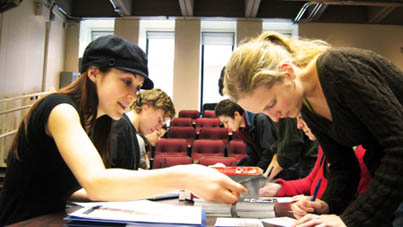Fighting for human rights, one letter at a time
Fighting for human rights, one letter at a time McGill University
User Tools (skip):
Fighting for human rights, one letter at a time

Héloïse Apestéguy-Reux (U1 Law), Sam Walker (U2 Law) and Julia Turvey (U2 Law) let the government know what they think, and encourage others to do the same.
Apathy is lame. At least it is according to the Faculty of Law's Human Rights Working Group (HRGW), who used the slogan as a call to arms urging fellow students to take action. Well, a call to pens to be more precise.
On Nov. 28, the student-operated club hosted a two-hour letter-writing frenzy aimed at both raising awareness for a number of human rights causes and putting pressure on government officials to address those causes.
"In law school we spend so much time studying that we can forget how easy it can be to make a tangible difference," says second-year law student Sam Walker, who came up with the idea. "Letter writing is a simple thing that only takes a few minutes, but it's been proven to work and it's very easy to do."
The results are in, and they are impressive. HRWG collected over 300 letters, postcards and petition signatures from McGill students. "We were very pleased with the turnout," says Walker, "not only of law students but also from the wider McGill community. We hope this will just be a starting point for creating a culture of activism."
"We've seen enough broken promises" read the more than 50 postcards addressed to Prime Minister Stephen Harper requesting that the government meet its 2005 commitment to fund the Global Fund to Fight AIDS, tuberculosis and malaria, facilitate access to Canadian generic drugs in developing countries and increase funding for front-line AIDS organizations.
The ongoing genocide in Sudan was also on the agenda, and yet another 50 postcards urged the Prime Minister to ensure Canada "take immediate and meaningful action, and dramatically increase our commitments to Darfur." While Mr. Harper's mail carrier may be hoping that's the end of it, not so. Over 40 handwritten letters were sent asking that that the government demand the repatriation of Omar Khadr, the Canadian citizen detained at Guantanamo Bay, Cuba.
Lest the Prime Minister feel singled out, a slew of letters were sent to various senators, asking them to support Bill C-280 creating a new right of appeal for refugee claimants; to Foreign Affairs Minister Maxime Bernier, asking that he sign the United Nations Convention on Migrant Workers; to Quebec Health Minister Philippe Couillard, asking him to abolish the three-month waiting period for health care benefits applying to immigrants to Quebec; and to Quebec Labour Minister David Whissel, asking him to allow live-in-caregivers to be eligible for benefits from the Commission de la santé et de la sécurité du travail.
Finally, scores of signatures were collected for a petition asking that the government reinstate the Court Challenges Program and the Law Commission of Canada and to end new rules for Status of Women Canada so that they can continue to fund organizations such as the National Association of Women and the Law.
For Walker, "these are all fundamental human rights issues," and this type of campaign, he hopes, will "get people thinking about raising awareness in the community, and especially about making it a habit to speak up."
On Dec. 10, as it does every year, the United Nations will mark International Human Rights Day. Sixty years ago on that day, the UN adopted its Universal Declaration of Human Rights, whose principal drafter was John Humphrey, a McGill law professor. Initiatives such as those of the HRWG would likely make Humphrey proud, but they also remind us that, 60 year later, there is still much work to be done. And while it may all seem overwhelming, even depressing, students such as those involved with the HRWG have shown how a little time and effort can help make an important difference. "If more people got into the habit of letting the government know how they feel," concludes Walker, "it could change everything." Besides, it sure beats apathy.
For information, visit www.hrwg.mcgill.ca.

